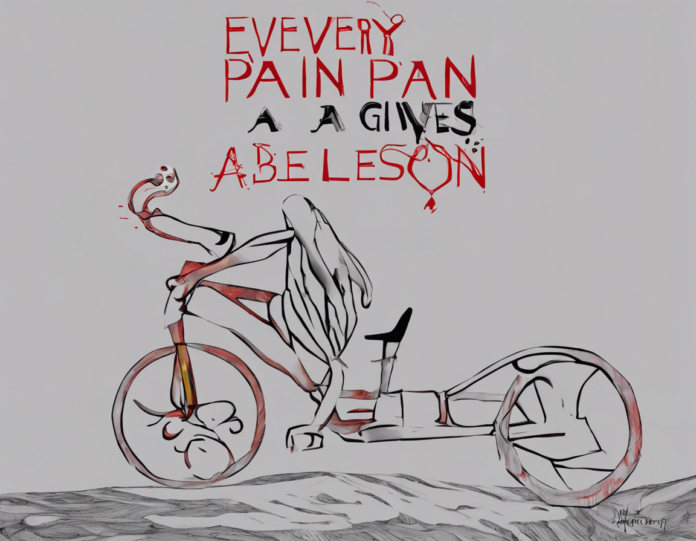Introduction
Pain is an inevitable part of the human experience. Whether physical or emotional, pain can be overwhelming and debilitating. However, pain is not always negative. In fact, pain has the power to be one of the greatest teachers in life. Learning from pain can lead to personal growth, resilience, and a deeper understanding of ourselves and the world around us.
Understanding Pain
Pain is a universal experience that manifests in various forms. It can be physical, such as injury or illness, or emotional, like heartbreak or loss. While our instinct may be to avoid pain at all costs, it is crucial to recognize that pain serves a purpose in our lives. Pain is our body’s way of signaling that something is wrong and needs attention. Similarly, emotional pain can indicate areas of our lives that require healing or change.
Embracing Pain as a Teacher
Instead of shying away from pain, we can choose to embrace it as a powerful teacher. By learning from pain, we can gain valuable insights and grow in ways we never thought possible. Here are some ways pain can serve as a teacher in our lives:
1. Resilience
Pain can test our resilience and inner strength. Overcoming painful experiences can build resilience and empower us to face future challenges with courage and grace. Each painful experience we endure strengthens our resilience muscles, equipping us to navigate life’s ups and downs with greater ease.
2. Self-Discovery
Pain can lead to profound self-discovery. When we confront painful emotions or experiences, we have the opportunity to delve deep into our inner selves and uncover hidden truths. Learning from pain can reveal our strengths, weaknesses, values, and beliefs, ultimately leading to a greater sense of self-awareness and personal growth.
3. Empathy
Experiencing pain can cultivate empathy and compassion for others. When we have walked through our own painful experiences, we can better understand and empathize with the struggles of others. Pain can break down barriers and connect us on a deeper level with those around us, fostering a sense of community and support.
4. Transformation
Learning from pain has the power to transform us. When we approach pain with an open mind and heart, we allow it to catalyze positive change in our lives. We can emerge from painful experiences as stronger, wiser, and more resilient individuals, ready to embrace new opportunities and possibilities.
Coping Strategies for Dealing with Pain
While learning from pain can be a transformative process, coping with pain effectively is essential for our well-being. Here are some strategies to help navigate painful experiences:
-
Seek Support: Reach out to friends, family, or a therapist for emotional support during painful times. Sharing your pain with others can help alleviate feelings of isolation and provide perspective and comfort.
-
Practice Self-Care: Engage in activities that nurture your mind, body, and soul. Prioritize self-care practices such as exercise, meditation, journaling, or spending time in nature to promote healing and self-compassion.
-
Mindfulness and Acceptance: Embrace pain with mindfulness and acceptance. Rather than resisting pain, practice being present with your feelings and accepting them without judgment. Mindfulness can help you navigate pain more effectively and foster a sense of inner peace.
-
Learn from the Experience: Reflect on the lessons pain has taught you. What insights have you gained? How have you grown from the experience? Use pain as a catalyst for personal growth and transformation.
-
Set Boundaries: Establish boundaries to protect yourself during painful times. Learn to say no to activities or people that drain your energy or exacerbate your pain. Prioritize your well-being and honor your needs.
Frequently Asked Questions (FAQs)
-
Is it healthy to experience pain?
Yes, experiencing pain is a normal part of the human experience. It is our body’s way of signaling that something is wrong and needs attention. -
How can I differentiate between healthy and unhealthy pain?
Healthy pain serves a purpose in alerting us to potential issues that need addressing. Unhealthy pain may be persistent, overwhelming, or detrimental to our well-being. -
Can pain be a catalyst for personal growth?
Absolutely. Learning from pain can lead to profound personal growth, resilience, and self-discovery. Embracing pain as a teacher can transform our lives in meaningful ways. -
What role does resilience play in coping with pain?
Resilience is essential in navigating painful experiences. Building resilience can empower us to overcome challenges, adapt to adversity, and thrive in the face of pain. -
How can I support others in pain?
Offering empathy, compassion, and a listening ear can help support others in pain. Encourage open communication, validate their feelings, and provide practical assistance as needed.

